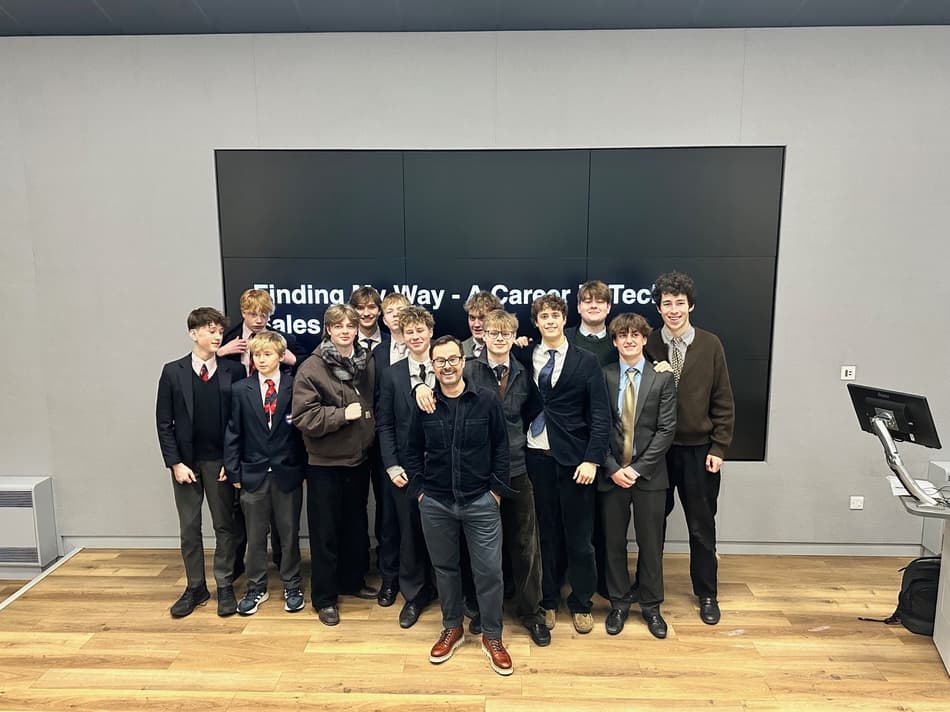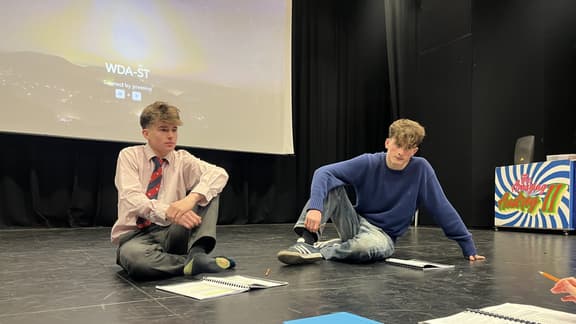
Meeting Characters from Our Year 10 and 11 Production – ‘The Curious Incident of the Dog in the Night-Time’
We recently joined Year 11’s Ed and Year 11’s Sam in rehearsals for this year’s Year 10 and 11 production The Curious Incident of the Dog in the Night-Time. For those of you who may not know the play, it was originally performed at the National Theatre, and tells the intricate story of Christopher Boone, a 15 year old, exceptionally gifted at Maths, but who finds people confusing. The discovery of a dead dog in his neighbour’s garden leads him to investigate – against his Father’s wishes. It’s not long before this investigation leads to revelations about Christopher’s mother’s death (no spoilers!) and the discovery that his Father was the dog killer.
This play is fundamentally a tale of family and bravery, as Christopher realises he can achieve more than he ever thought, somewhat against the odds. But his character is tinged with the sadness of the frustration and rage his father feels and shows, and the impact that those feelings and emotions have on their already fragile relationship; as his father has been struggling to raise a child who is neurodiverse.
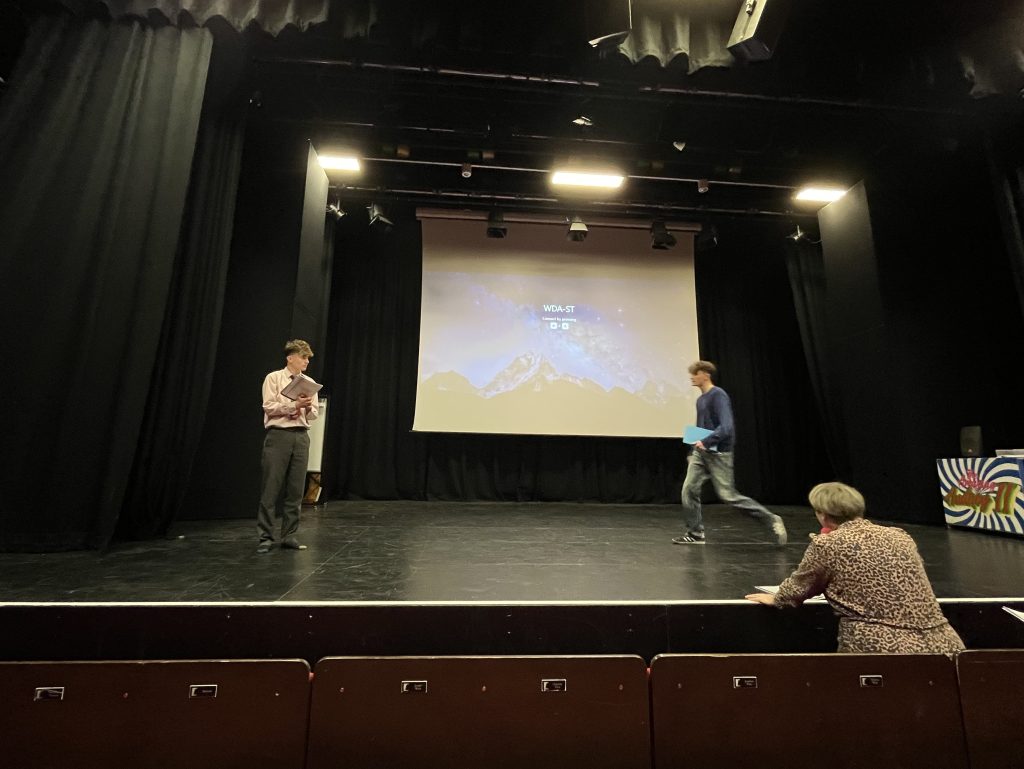
We joined rehearsals as Miss Mayes and Mr Williams talked Ed and Sam through their lines in a particularly challenging scene, in which there is a physical altercation. But this violence doesn’t just happen, it’s the result of a building and peaking tension between the two characters, between a father and son and this was the focus of the teaching.
With lots of opportunities to express a myriad of emotions, this scene could easily gather pace quickly, so the young actors spent time understanding how to build tension, to create a situation that the audience could see and feel – that they could work together on to share with the audience. Taking time to understand that there is a need for balance, and for keeping control of the scene, they also discussed and agreed proposed physical positions on stage, body language and the use and power of suggestion. One technique they practiced was pausing; learning the power of the pause, using punctuation in the script to allow the tension to build; they also discussed interruption, as this scene calls for each of them to cut into the others’ lines as part of their delivery. With all this talk of energy, Sam and Ed then rehearsed the scene physically having read through their lines.
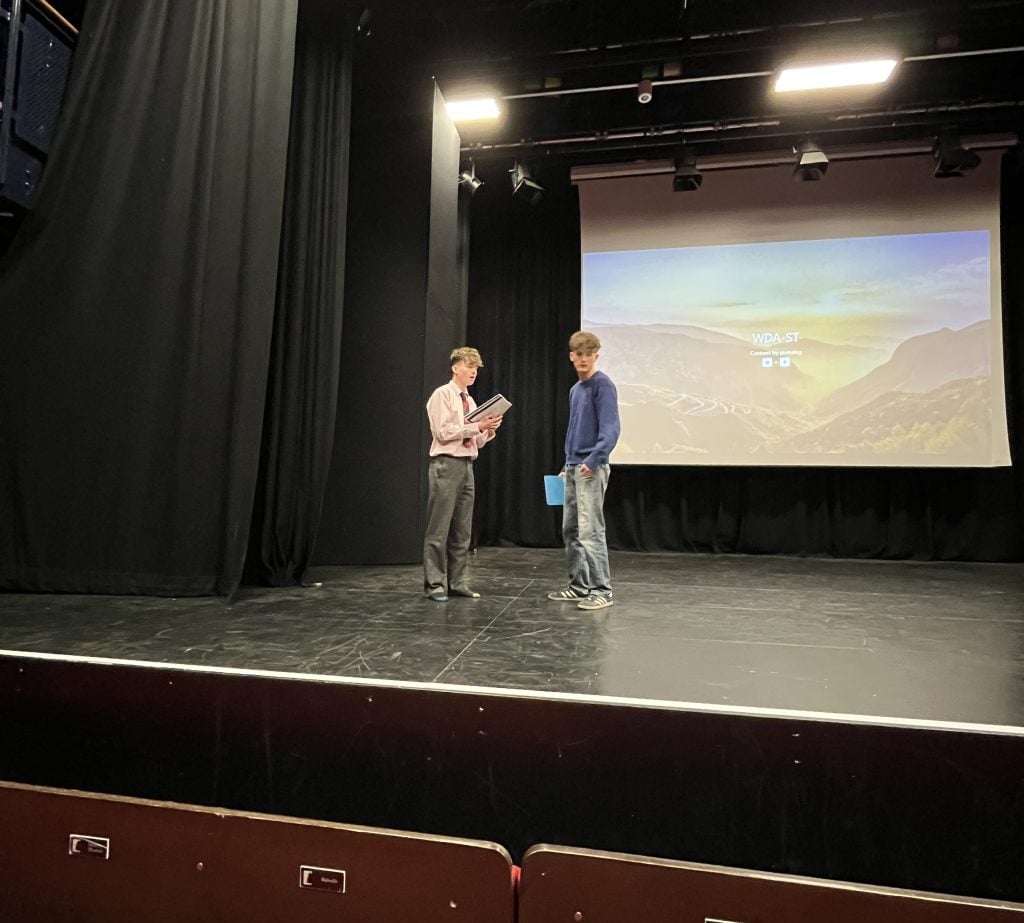
Year 11’s Ed plays Christopher’s father, also called Ed, and after this scene rehearsal he spoke to us about his character sharing,
“It’s all about learning to know when and how to build tension, but at the same time understanding the importance of control. The father son relationship on stage is extremely complex, as are both of the characters; my character is challenged by his son’s neurodiversity and the way it presents itself and affects his behaviour, combine this with the fact that he’s also lying and holding in a huge secret and it’s the perfect storm! That combination is challenging, to say the least – but he’s also great fun to play.”
Talking about the audition process he said,
“Sam and I actually auditioned together, so we had a chance to explore these characters before we were given the roles – I knew straight away that Ed was the character I wanted to play. Sam and I experimented with fight scenes, because a lot of this play has physical arguments, it was great to imagine how we might play these parts, and we talked a lot about how we’d work together – so being given the roles was brilliant.” He added, “It’s so great when you work hard during rehearsals and finally it comes together and you get to perform – I’m so passionate about Drama that often when people feel I’m missing out on other social events when I’m rehearsing at weekends for example, I honestly feel happy to give up my time, because I love it so much.”
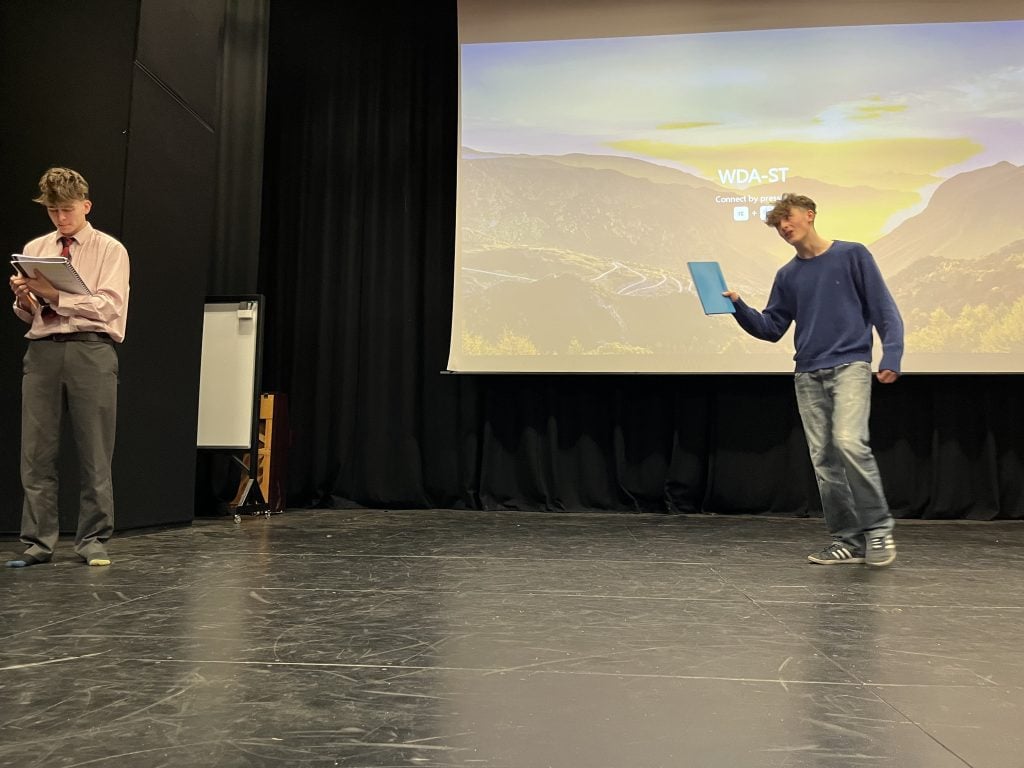
Gemma Mayes, Head of Drama added,
“Ed is portraying this character brilliantly already, and it’s quite a challenge and a lot of responsibility really because the play covers highly sensitive issues. There aren’t many plays where the central protagonist is neurodiverse, even in 2025, we rarely see or hear this narrative. It’s so important we remember there are those who may be watching and relating, and for that reason we’re working hard to ensure we’re not delivering a stereotypical father of a child with these challenges, we’re working hard to make sure we’re sensitive about delivering a character who’s having to cope with a child that doesn’t see the world through the eyes of others – and likewise when it comes to Sam’s role, that he’s not only showing one dimension to Christopher.”
Meeting Year 11’s Sam and talking to him about his character Christopher he shared,
“I’ve spent a lot of time researching, on my own and with the support of Mr Williams and Miss Mayes, to make sure I understand how to perform the character of Christopher. For me the challenge is that I’m not portraying one part of neurodiversity in Christopher’s character, we want to avoid that stereotyping as Ed explained, so in each scene I have to think about what the audience is seeing and understanding about this character.”
He continued,
“This isn’t just a story about a neurodiverse child, it’s the story of his personal challenges growing up and his relationship with his father – and how he learns to manage himself to achieve the most out of his life.”
Miss Mayes added,
“This is the story of a journey, of the underdog and growing up – it’s universal and relatable, and these young actors are working hard to portray these characters in the best way possible – they’re not only working hard in rehearsals but as Sam said, researching their characters and the situations they find themselves in, making sure they’re considering every detail – it’s brilliant to see them immersing themselves in the play.”
Talking about his focus in terms of performing to an audience, Sam continued,
“In this scene in particular it would be very easy to jump straight in, to go to the argument they’re having and to start screaming and shouting from the beginning – but what Ed and I are trying to do, is build the tension, communicate the atmosphere with silence, pauses and emphasis. Control is so important, because if we blow up into the row they’re going to have too soon we hit the ceiling of that interaction too soon, and the energy will blow out of it – and the audience will see. There’s so much to consider, it’s a brilliantly challenging play and I think on the face of it people might not see that straight away. I really hope that our audiences see everything we’re trying to share, through voice and body language.”
Tickets are now on sale for The Curious Incident of the Dog in the Night-Time, we hope you can join us on either Wednesday 12 and Thursday 13 February. Please visit TicketSource. to book your tickets.
More news
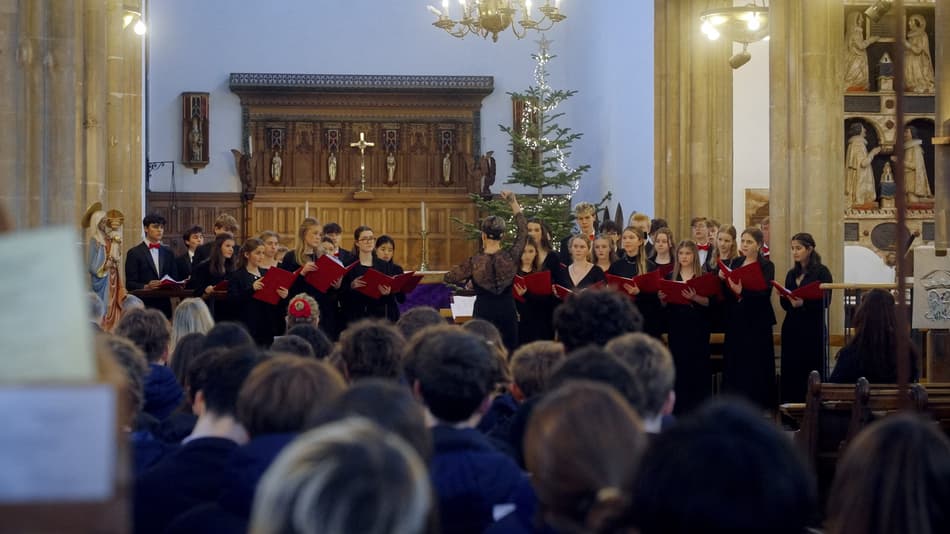
Carol Service at St Mary’s Church, Woodbridge

Mary, Joseph, Jesus and 'The Fleece Force' – Woodbridge School Prep Nativity
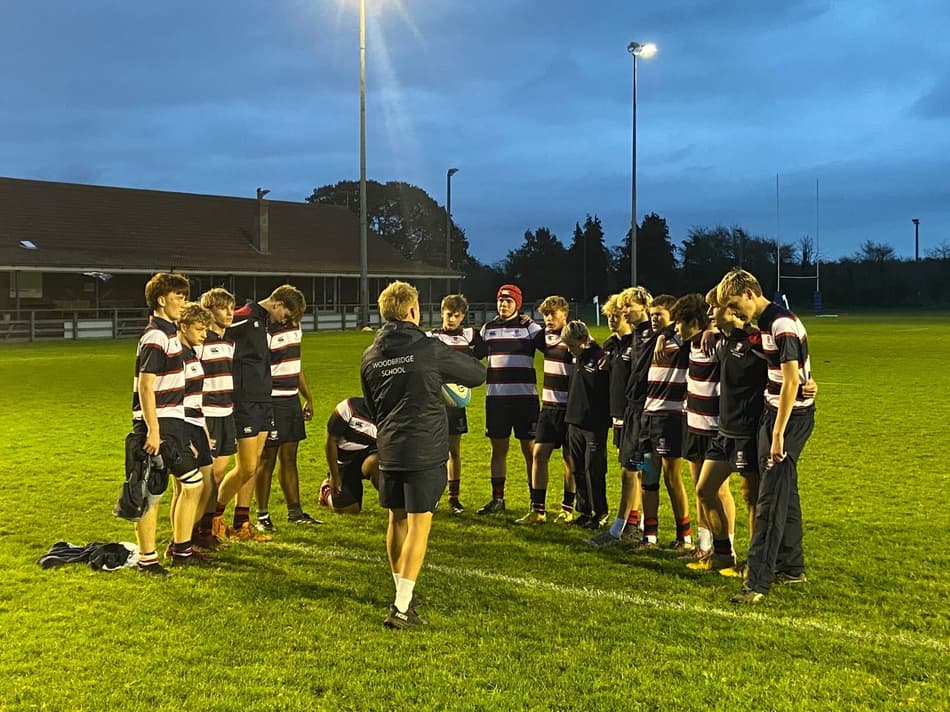
Woodbridge Rugby Roundup - Dec 2025
